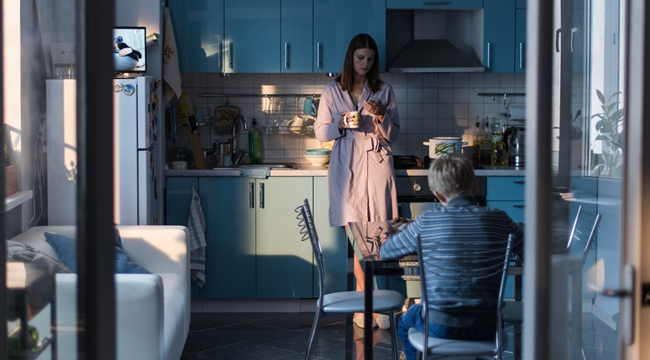
It’s no doubt a coincidence that Loveless, the latest film from Leviathan director Andrey Zvyagintesev and an Oscar nominee for Best Foreign Language Film, should start appearing in American theaters the weekend after Valentine’s Day, but it’s apt. Set on the outskirts of Moscow — where blocky apartment buildings abut deep, dark woods — it portrays what happens after romance fades and the passion slips away, and who gets hurt by its absence. It’s a slow-motion tragedy in which one couple’s disillusionment comes to stand in for a kind of national malaise. Early on, one character drives to work as a news broadcast from the winter of 2012 talks about “apocalyptic sentiments,” but the film is less concerned with cataclysm than the way things fall apart in slow motion.
There is a catastrophe at the heart of the film, but Loveless takes some time getting there. It opens with a scene in which 12-year-old Alexey takes the long way home from school, walking a path through the woods and taking his time as he makes his way back to one of those interchangeable apartments, where he lives with his mother Zhenya (Maryana Spivak) and father Boris (Aleksey Rozin). For now. It soon becomes apparent why Alexey was in no rush to get there. His mother berates him as she shows the apartment to prospective buyers, a young couple expecting a child. His father isn’t home and won’t be until after Alexey has gone to bed. When Boris arrives, he finds Zhenya drinking wine and watching TV while thumbing through social media. They launch into the latest of a long string of fights with little regard as to whether or not Alexey can hear them. In the film’s most devastating shot, we see that he can as he sobs silently behind a door, taking in every awful detail of their argument.
Then, the film seems to forget about Alexey, which seems odd at first but soon makes sense. Instead, it follows Boris to work, where he nervously chats with a co-worker about his upcoming divorce and the impact it could have on his job given that being married with children is essentially a job requirement thanks to his strictly religious boss. One co-worker, it turns out, hired a fake wife and kids for a company event, but Boris might not have to go that far: He has a pregnant girlfriend on the side, ready to sub in. Zhenya, too, has a lover, a rich man who seems willing to take her away from her troubles. Zvyagintesev shows both halves of the central marriage engaging in long, fairly explicit sex scenes with their new partners that serves several purposes: depicting that though their passion has dimmed for each other they’re able to summon it for others, as well as hinting that it won’t last by suggesting this is what they might have been like together before a chasm opened up between them.
Then Alexey falls into that chasm. When he fails to show up for school, it takes two days and a phone call for either Boris or Zhenya to notice. With the help of a volunteer organization, they start searching for him, following the well-established protocols when a child goes missing of checking with hospitals and family and neighbors then fanning out across a desolate landscape where it seems like anyone could disappear. And it’s here that sense of dread Zvyagintesev has been cultivating from the first scene edges into horror, and the small story of a crumbling marriage starts to feel bigger.
Zvyagintesev shoots the film in long, slow, elegant shots, whether following Boris through a crowded cafeteria or watching as he joins a team searching what appears to be an abandoned resort for his son. The landscape seems to mirror the chill that’s set in between him and his wife, and the film starts to feel like a depiction of a country that’s seen its own passion dimmed by exhaustion, indifference, and neglect.
The filmmaking is so strong and the scope so large it helps obscure the fairly simple moral at the heart of the script by Zvyagintesev and Oleg Negin. Bad parenting hurts children and neglect leads to harm. And though both Boris and Zhenya are both unmistakably bad parents, Zhenya fares far worse here. Where Boris is too absent, Zhenya is seen browbeating her kid or taking selfie after selfie to project a better version of herself out in the world. Spivak’s performance gives her some depth, particularly during a painful visit to her mother that suggests even her parenting might be an improvement over the way she was raised, but she still too often reads as a cliche.
The film, however, remains darkly mesmerizing in spite of some off notes, beginning in a personal purgatory that opens up to reveal an entire country has seemingly slipped into a similarly dark state, whether via the business-like approach to rescue unit takes to looking for yet another lost child or the slanted reports of the war in Ukraine heard blaring from the televisions. Hopelessness takes hold early, and those gripped by it learn either to live with it even if it means hurting those around them, or just disappear.
Loveless opens in New York and Los Angeles on Friday, February 17th before expanding.






